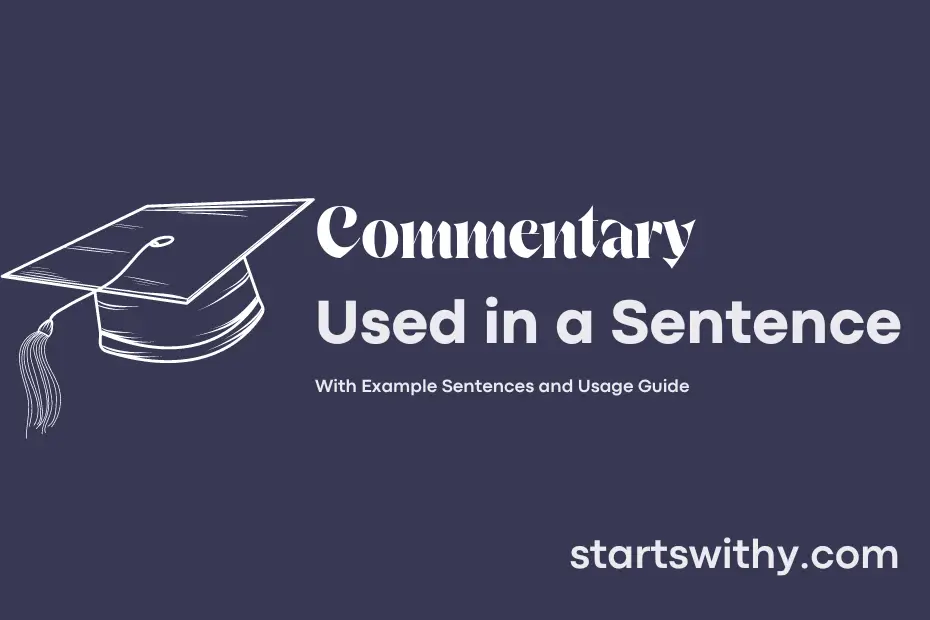Have you ever come across an example sentence with “commentary” and wondered what it really meant? In writing, commentary serves as an analysis or explanation provided alongside a main text, offering insight, critique, or reflection on the content.
Commentary can be found in various forms of literature, journalism, or academic writing to help elucidate the author’s thoughts or to provide context for the reader. It adds depth and perspective to a piece of writing, offering a unique lens through which to interpret the subject matter.
7 Examples Of Commentary Used In a Sentence For Kids
- I love to listen to commentary during cricket matches.
- The teacher gave us commentary during storytime.
- We can hear commentary during a movie to understand the story better.
- The radio announcer provided commentary for the live sports event.
- The nature guide offered commentary during our nature walk.
- The sports announcer gives commentary on the game happening.
- The news anchor provides commentary on current events.
14 Sentences with Commentary Examples
- Students often find it helpful to listen to commentary while studying for their exams.
- Attending a live sports match with commentary in the background can be a great stress-reliever for college students.
- Watching documentaries with commentary can provide valuable insights on various subjects for students.
- Commentary on current affairs can help students stay informed about important news and events.
- Engaging in group discussions with commentary from different perspectives can enhance students’ critical thinking skills.
- Podcasts featuring expert commentary are a popular way for college students to expand their knowledge on various topics.
- The use of commentary in academic journals can help students understand complex theories and concepts better.
- Watching a movie with audio commentary can offer students a deeper understanding of filmmaking techniques and storytelling.
- Students can benefit from reading books with commentary by scholars to gain a deeper insight into literary works.
- Participating in seminars with commentary from guest speakers can provide students with valuable real-world insights.
- Following social media influencers who provide commentary on trending topics can keep college students well-informed.
- College students often rely on online forums for commentary and discussions on their academic assignments.
- Watching debates with commentary from experts can help students develop their argumentative and reasoning skills.
- Attending workshops with commentary from industry professionals can give students a better understanding of career opportunities.
How To Use Commentary in Sentences?
To use Commentary in a sentence, start by introducing your main idea or argument. This could be a statement you want to elaborate on or a topic you want to discuss. Once you have your main point, insert a commentary to explain, analyze, or provide additional information about it.
For example, if your main idea is “The protagonist’s actions in the story reveal his true character,” your commentary could be “This highlights the internal conflict he faces throughout the novel.” Make sure your commentary enhances the reader’s understanding and adds depth to your statement.
When adding commentary in a sentence, it’s important to connect it smoothly to your main idea. Use transition words like “therefore,” “however,” or “thus” to show the relationship between your statement and the commentary. This helps to create a coherent and persuasive argument.
Remember to keep your commentary concise and relevant to the main point of the sentence. Avoid going off on tangents or introducing unrelated information. Focus on providing insightful analysis or explanation that strengthens your argument and engages the reader.
Practice incorporating commentary into your sentences to improve your writing skills. With time and effort, you’ll learn how to effectively use commentary to enhance your ideas and communicate more effectively.
Conclusion
In conclusion, sentences with commentary serve as valuable tools in providing additional context, explanation, and analysis to the main idea or message being conveyed. By incorporating commentary, writers can help readers better understand the significance of the information presented, deepen their comprehension, and encourage critical thinking. Whether used in academic papers, articles, or creative writing, sentences with commentary add depth and insight, enhancing the overall quality of the content.
Furthermore, by offering commentary alongside facts, opinions, or observations, writers can engage their audience, spark conversation, and prompt reflection. This approach not only helps to connect the reader with the material on a deeper level but also allows for a more enriching and informative reading experience. Ultimately, sentences with commentary play a crucial role in enhancing communication, fostering understanding, and encouraging readers to consider different perspectives and insights.



